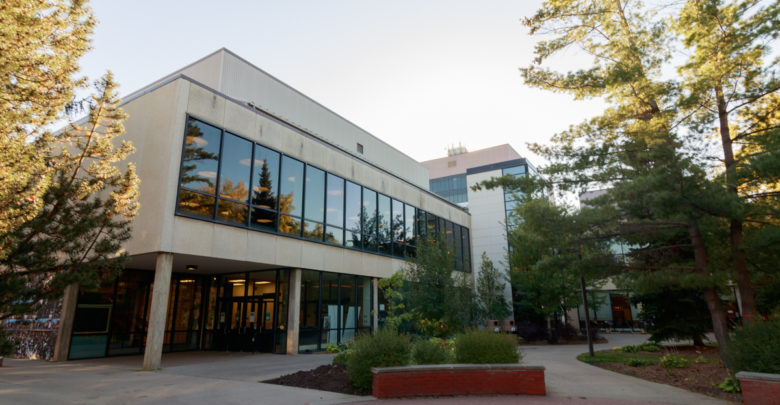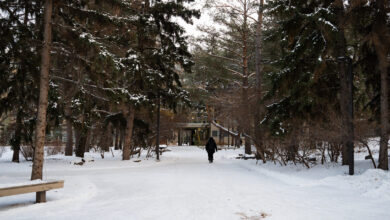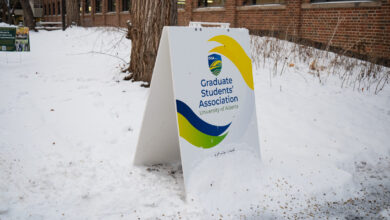SU criticizes U of A admin for lack of student supports, proposes new initiatives
In light of this decision, the SU is asking the university to ban all proctoring software and to standardize the course load of courses
 Christien Ford
Christien FordThe University of Alberta’s Students’ Union has publicly opposed the university administration’s decision to not extend the scheduled course withdrawal deadline and is now calling on the university to support students in alternative ways.
The Students’ Union released a statement condemning the University of Alberta’s decision not extend the Fall 2020 semester course withdrawal date by keeping it November 30 for North campus and December 2 for Augustana. Previously, the Students’ Union asked the university to extend the deadline by one week.
Previously the Students’ Union also asked for the winter break to be extended, but it was announced later the same day that the university already did.
The Students’ Union is now calling on the university to support students in two alternative ways: by banning all proctoring software and creating a standardized workload for the Winter 2021 semester.
University did not “prioritize students’ needs” with failure to extend withdrawal deadline SU said
In the statement, the Students’ Union said the decision “showcases a lack of will to prioritize students’ needs,” from the university.
In an interview with The Gateway, David Draper, Students’ Union vice-president (academic), said he discussed extending the deadline withdrawal with university administrative for two weeks. For Draper, pushing for the extension was a way to acknowledge the effect of the pandemic on students.
“This semester was the accumulation of a thousand small things that nobody could expect,” he said. “By extending the withdrawal deadline, that’s a way to showcase to students that we hear, we acknowledge, and we know that things didn’t go as planned.”
Building on the idea that the semester has been filled with unexpected changes, Draper said the extension would give students crucial time to re-evaluate their academic situation.
Specifically, Draper described the extra week as a time for students to receive more grades back or to figure out the next time a class they’re considering dropping will be offered.
Though the university has not issued a statement outlining why they chose to not extend the deadline, Draper said the university told him the main concern was around universal student ratings of instruction (USRI), which would, in turn, effect professors’ faculty evaluations (FEC). Night classes, which have final exams before classes end, were also a concern brought up by the university.
“[There was concern] that if the deadline to submit USRIs was prior to the withdrawal deadline, professors felt as though they were getting feedback from students who withdrew from their course, which would impact their FEC’s,” Draper said.
“There were a few minute issues — nothing I saw reasoning a full decline of the proposal.”
In a statement provided to The Gateway, U of A vice-provost & university registrar Melissa Padfield said multiple factors were considered in the decision.
“We considered many factors both for and against the idea of extending the Withdrawal deadline,” Padfield said. “We felt that the extension of the Winter 2021 start date and encouraging students to speak directly with the appropriate student services to request personal accommodations and modifications would best meet the needs of our community at this time.”
“We have also messaged faculties about the importance of accommodation and modification for students who need it.”
SU provides alternative ways university could support students
Despite the university rejecting the suggestion to extend the withdrawal deadline, the Students’ Union is still outlined two other measures the university could implement to better support students.
“With the withdrawal extension, there was a lot of reasons to do that…. one of those is the fact that it would show students that the university is listening and that the university cares,” Draper said.
“Having these alternatives is another way for them to do that. It doesn’t solve the same issues…. but it still provides the university with the opportunity to turn to students… to acknowledge that things weren’t normal and to regain that trust and hope that winter may be a bit better.”
One of the asks in the statement was standardization of courseloads. According to Draper, he has heard complaints since September about the increased workload online classes create. He said students are being asked to read through more material and are kept for longer lectures.
“We’ve got synchronous lectures consistently going for longer or asynchronous classes that are booked for an hour three days of the week…. but you’re getting two-hour lectures,” he said. “Students’ are expected to dedicate a lot more time to each class to a level that’s not sustainable. It’s having a large impact on student mental health.”
Referring to the university’s Centre for Learning’s recommendations, Draper said each class should only provide roughly eight hours of work per week.
In asking the university to standardize workload for students, Draper hopes this will make online school more manageable for students.
“[This] is something I would like to see regulated and enforced more,” Draper said. “By the time the clock hits 9:50 a.m. you have a line of students at the door telling you class is over, it’s time to get the next class in. That doesn’t happen over Zoom.”
Draper is also asking the university to ban the online proctoring services many students have used over the fall term, something he has been working on all semester. Draper said one reason for this ban is the inherently racist technology used by the proctoring services. Specifically, the software struggles to pick up the faces people of colour with darker skin.
“Often times these softwares will say to students’ of colour that they’re not well-lit, that they’re not in a room with enough light,” he explained. “It’s not the lighting. There’s no conspiracy of students of colour with bad lighting — it’s the software not recognizing dark skin.”
Further concerns outlined by Draper included how the services also block students from using accessibility software like screen readers and how many students don’t have the privilege to find a quiet room that fits the requirements of the software, such as students who parent.
So far, Draper said the university has created a committee to research the implications of continued use of the software and he continues to meet with them.
Though larger courses may need the service because of the size of the class, Draper emphasized that online proctoring should be the exception, not the standard.
“The software is not being used when explicitly needed — there’s a bunch of assessments that don’t need this level of invasive surveillance,” he said. “Online proctoring is being used in places it shouldn’t be and to me, that’s unacceptable.”




